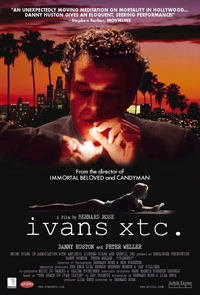Notes from Hollywoodland: Rose’s Heady, Meaningful Tolstoy Update
 “It is as if I had been going downhill while I imagined I was going up,” realizes the titular protagonist of Leo Tolstoy’s famed novella The Death of Ivan Ilyich. Considered a masterpiece of Russian literature and published in 1886, director Bernard Rose takes the text and transposes it to the turn of the following century in Hollywood with his 2000 film Ivans xtc., an undertaking that sounds tedious but actually makes for quite an apt and inspired adaptation. One hardly needs to be readily familiar with Tolstoy’s novella to appreciate or understand what the film is ultimately up to, but doing so provides an alternative subtext in approaching what Rose is doing—specifically that one of humankind’s most enduring tragedies is to embrace the superficialities of existence instead of building a meaningful life, just as as Tolstoy’s character has been interpreted as ‘living without meaning.’
“It is as if I had been going downhill while I imagined I was going up,” realizes the titular protagonist of Leo Tolstoy’s famed novella The Death of Ivan Ilyich. Considered a masterpiece of Russian literature and published in 1886, director Bernard Rose takes the text and transposes it to the turn of the following century in Hollywood with his 2000 film Ivans xtc., an undertaking that sounds tedious but actually makes for quite an apt and inspired adaptation. One hardly needs to be readily familiar with Tolstoy’s novella to appreciate or understand what the film is ultimately up to, but doing so provides an alternative subtext in approaching what Rose is doing—specifically that one of humankind’s most enduring tragedies is to embrace the superficialities of existence instead of building a meaningful life, just as as Tolstoy’s character has been interpreted as ‘living without meaning.’
Ivan Beckam (Danny Huston), a highly successful Hollywood agent has suddenly died. With a very important client list, his colleagues scramble to take over, dismissing the news that he had lung cancer as a mere cover-up for a possible overdose. Everyone knows Ivan likes his cocaine. Following the funeral, we recount the last few days of the high roller, his causal relationship with girlfriend Charlotte (Lisa Enos) and the troubling final project he was working on packaging for a rising screenwriter (James Merendino) and its diva star (Peter Weller).
Visually, Ivans xtc. is an ugly film. Shot entirely in high-definition and using only natural lighting, which often brings a garish pallor to the people and places working behind the scenes in one of the world’s largest entertainment machines, Rose’s limitations (meaning this, of course, was filmed with independent financing outside of the studio system) are reminiscent of Denmark’s Dogme 95 film movement which had unspooled only a couple years prior. And best of all, it allows Rose an unappealing intimacy in an environment that can only justly be realized as toxic.
In many ways, Ivans xtc. feels very much aligned with the cynical, poisonous later films of Abel Ferrara, and something like 1997’s The Blackout comes to mind in look and tone. But, perhaps due to the underlying base text, Rose’s film also reaches a certain empathy for Huston’s smiling company man, an emotional core that works in interesting ways as a film obviously intertwined with Hollywood but also looking beyond the bitterness at the industry to be a film with the ability to reach great emotional depths.
The film, which is quite difficult to find a copy of currently, served as Rose’s second Tolstoy adaptation, following a handsome 1997 traditional adaptation of Anna Karenina starring French beauty Sophie Marceau. It would spark a series of modernized adaptations of the author’s lesser known works from Rose (and starring Huston), such as The Kreutzer Sonata, 2 Jacks, and Boxing Day. Huston, who comes from his own legendary lineage of Hollywood royalty, is superb in this early collaboration with Rose as the coke-fueled Ivan Beckham.
Rose worked with a bare bones crew, many of whom take on supporting roles—this is sometimes too evident at times, as when Beckham engages in a final reunion with his father and sister, people baffled at his consuming and thankless career. It’s a sequence marred by a bit of uneven acting, though serves as the only insistently rocky instance. Weller is equally smarmy as a monopolizing actor, and Rose perfectly captures the meaninglessness of Beckham’s life in a sequence with Weller and James Merendino as a spurned screenwriter interrupting his funeral to argue vehemently over a film project. With empty victories only as important as the daily headlines in the short-lived trades, Tolstoy’s tale of the meaningless judge becomes a rather effective analogy to the modern day film industry.
Several references to the closeted queer personalities beginning to come out of the closet and attempt to make their marks in the periphery makes for an equally interesting time capsule documenting how little things have changed in the fifteen years later in an industry that supposedly reflects out current cultural climate (including a cameo from Valeria Golino as a lesbian film director). But the most powerful moments are evident in the closing frames, with dialogue blocked out by threads of classical music frequenting the film (Wagner, Schubert, etc.) as Ivan lays dying, alone with an empathetic nurse. To borrow another line from Tolstoy’s original text, there’s a tragic finality Rose captures brilliantly – “And now it is all done and there is only death.”
Reviewed on August 15 at a 2015 retrospective for Bernard Rose at the American Cinematheque – Aero Theater. 93 Mins.
★★★★/☆☆☆☆☆


